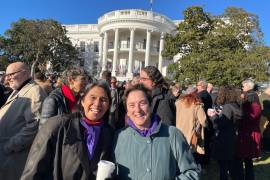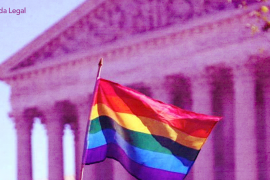
What Happened at the Supreme Court
Blog Search
Wednesday was a momentous day.
The Supreme Court overturned Section 3 of the so-called Defense of Marriage Act (DOMA), which had required the federal government to treat legally married same-sex couples as single.
The Court also held that the proponents of Proposition 8 had no right to appeal the federal district court ruling that the California initiative is unconstitutional. The freedom to marry will soon return to California.
Read the FAQs After DOMA: What It Means for You and Marriage for Same-Sex Couples in California. Still have questions? Contact our Legal Help Desk.
Windsor v. United States
The victory in Windsor v. United States is particularly sweet. It came 10 years to the day after Lambda Legal’s historic victory in Lawrence v. Texas, which struck down all remaining state laws criminalizing private, non-commercial sexual intimacy among consenting adults. Windsor expressly relies on Lawrence in concluding that DOMA’s refusal to recognize same-sex couples’ marriages demeans those couples “whose moral and sexual choices the Constitution protects.”
The Windsor decision also expressly relies on the earlier victory won by Lambda Legal, the ACLU and a group of Colorado attorneys in Romer v. Evans—which struck down a state constitutional amendment barring the government from protecting lesbians, gay men and bisexuals against discrimination—in concluding that laws like DOMA that impose “discriminations of an unusual character” must be given “careful consideration” by the courts.
Once again, this ruling shows that victories build upon victories. It is significant not only for what it decides, but for the additional building blocks it creates that will help us in the cases we have yet to win.
The decision in Windsor (written by Justice Anthony Kennedy, who also authored the Lawrence and Romer majority opinions) concludes that a principal effect Section 3 of DOMA “is to identify a subset of state-sectioned marriages and make them unequal.” Indeed, because that portion of DOMA applied so broadly, it wrote “inequality into the entire United States Code.”
The principal purpose of DOMA, the Court recognizes, was “to impose inequality.” This “avowed purpose and effect,” it explains, “imposes a disadvantage, a separate status, and so a stigma upon all who entered into [lawful] same-sex marriages.” DOMA “forces same-sex couples to live as married for the purpose of state law but unmarried for the purpose of federal law, thus diminishing the stability and predictability of basic personal relations.”
In doing this, DOMA tells same-sex couples “and all the world” that their marriages are unworthy of federal recognition. The Supreme Court further explained this “humiliates tens of thousands of children now being raised by same-sex couples” and “makes it even more difficult for the children to understand the integrity and closeness of their own family and its concord with other families in their community and in their daily lives.”
Although the Windsor decision only deals with the federal government’s refusal to honor lawfully entered marriages, it will be hard for lower courts to ignore the implications of this recognition in challenges to state laws barring same-sex couples from marrying. Such states similarly tell same-sex couples “and all the world” that their relationships are unworthy of recognition through marriage. This too humiliates these couples’ children and makes it more difficult for those children “to understand the integrity and closeness of their own family” and how it is similar to the families of their friends.
The burdens DOMA imposes upon same-sex couples, the Windsor decision recognizes, are both “visible and public” and are intensely personal and “demean[ing].” Because DOMA has “no legitimate purpose,” it violates the Fifth Amendment’s Due Process Clause and guarantee of equal protection.
As a result of the Windsor decision, married same-sex couples who live in states that recognize their marriage should be eligible virtually right away for the same protections, responsibilities, and access to federal programs afforded to all other married couples. This will have sweeping impacts across federal law with regard to taxes, immigration, bankruptcy, benefits and much more. It may take some time to prepare for these changes, but President Obama has already directed officials to implement the decision “swiftly and smoothly.”
For legally married couples living in states that do not recognize their marriage, there are still many questions about when they will be equally able to share in federal protections, responsibilities, and programs. This is because the federal government typically defers to the states in determining whether a couple’s marriage is valid. Some federal agencies look to the law of the state where a couple married while others look to the law of the state where the couple is living now.
We think the federal government can and should take action, where necessary, to ensure that married couples in all states have access to the largest number of federal programs. For now, same-sex couples who live in states with bans on marriage by same-sex couples need to proceed with caution before making the decision to marry. (Read the FAQs developed by Lambda Legal and 10 other LGBT organizations: DOMA: What It Means for You.)
Hollingsworth v. Perry
Next let’s turn to the Supreme Court’s decision in the Hollingsworth v. Perry challenge to Prop 8. Some may think that the Court dodged the issue when it ruled that the proponents of Prop 8 did not have the right to appeal the lower court’s holding declaring Prop 8 unconstitutional., But the decision actually rests on a substantive point that we and our colleagues have been making in marriage cases for years: Those who oppose marriage for same-sex couples may have strong views on the subject, but they are not personally harmed when same-sex couples marry.
As Chief Justice John Roberts explains, standing (the legal term for the right to bring a case or to appeal) is limited in federal courts to those who have suffered a personal and concrete harm. While proponents put energy into getting Prop 8 on the ballot, once the measure passed, they are no different than any other Californian, who will in no way be personally harmed if the same-sex couple down the street can marry. As the Hollingsworth decision explains, the district court’s injunction does not order the Prop 8 proponents “to do or refrain from doing anything.” They therefore have “no ‘direct stake’ in the outcome of their appeal.”
As we argued, it would be troubling for unelected private parties, who “answer to no one,” who “decide for themselves, with no review, what arguments to make and how to make them,” and who owe no responsibility to the state to be able to proceed without consideration of the ramifications of their actions on the state’s policies.
As a result of the Court’s decision that the proponents of Prop 8 did not have the right to appeal, the Justices did not decide whether or not the U.S. Constitution requires states to allow same-sex couples to marry. (They also didn’t decide whether states must recognize marriages same-sex couples have entered in other states.) The district court’s ruling will again be in effect once the Ninth Circuit lifts its stay. This means that same-sex couples should be able to get married again in California in about a month.
California’s Governor and Attorney General have made clear, in response to the Supreme Court’s decision today, that all county officials in the state must comply with that injunction and allow same-sex couples throughout the state to marry, as soon as the Ninth Circuit acts. So, while we may not have more June weddings for same-sex California couples this year, they are coming soon!
It’s immensely gratifying to be a lawyer when the legal process works. The joy we at Lambda Legal are feeling nonetheless is diminished by the harms the Supreme Court recently dealt civil rights protections in overturning a key portion of the Voting Rights Act and in making it more difficult for employees to sue for employment discrimination, harassment and retaliation under Title VII (the federal law barring workplace discrimination based on race, national origin, religion and sex). We join our allies in calling on Congress to correct those rulings.
The victories are a result of the hard work of many people. The Windsor case could not have proceeded without Edie Windsor standing up for our entire community, and without the excellent work of our colleagues at the ACLU and the Paul Weiss law firm. Similarly, the plaintiffs in the Hollingsworth case, their outstanding lawyers (particularly Ted Olson and David Boies), and the American Foundation for Equal Rights, which backed the case, are all to be saluted.
Today’s victories also would not have occurred, I firmly believe, but for all who have had the courage to come out to their friends, families, neighbors and co-workers; all the LGBT people and our allies who have worked to ensure that marriage is equally available in 13 states and the District of Columbia; all those who changed public opinion such that it now strongly supports marriage equality; and all the donors who support the work of all who fight for our community. Thank you all.
This has been a long road. Lambda Legal has been fighting for marriage equality for nearly two decades. But the struggle for marriage equality is far from over. Same-sex couples still cannot marry in 37 states. Lambda Legal will press forward on our marriage lawsuits in New Jersey, Nevada and Illinois. We will not rest until same-sex couples are treated equally not only by the federal government but in every state and community across the nation. We also are busy working on many other issues affecting our community.
The fight continues. But Wednesday’s decisions brought much to celebrate.
Read the FAQs After DOMA: What It Means for You and Marriage for Same-Sex Couples in California.
Still have questions? Contact our Legal Help Desk.




